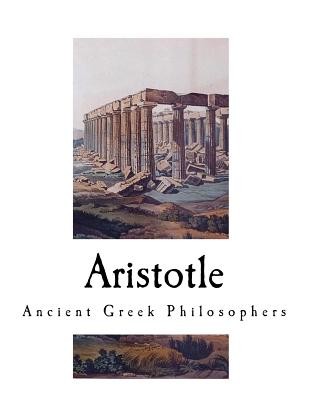
- We will send in 10–14 business days.
- Author: A E Taylor
- Publisher: CreateSpace Independent Publishing Platform
- ISBN-10: 1724376969
- ISBN-13: 9781724376961
- Format: 21.6 x 28 x 0.3 cm, minkšti viršeliai
- Language: English
- SAVE -10% with code: EXTRA
Reviews
Description
Aristotle by A. E. Taylor. Aristotle; 384-322 BC, was an ancient Greek philosopher and scientist born in the city of Stagira, Chalkidiki, in the north of Classical Greece. Along with Plato, Aristotle is considered the "Father of Western Philosophy", which inherited almost its entire lexicon from his teachings, including problems and methods of inquiry, so influencing almost all forms of knowledge. The so-called works of Aristotle present us with a curious problem. When we turn from Plato to his pupil we seem to have passed into a different atmosphere. The Discourses of Socrates exhibit a prose style which is perhaps the most marvellous of all literary achievements. Nowhere else do we meet with quite the same combination of eloquence, imaginative splendour, incisive logic, and irresistible wit and humour. The manner of Aristotle is dry and formal. His language bristles with technicalities, makes little appeal to the emotions, disdains graces of style, and frequently defies the simplest rules of composition. Our surprise is all the greater that we find later writers of antiquity, such as Cicero, commending Aristotle for his copious and golden eloquence, a characteristic which is conspicuously wanting in the Aristotelian writings we possess. The explanation of the puzzle is, however, simple. Plato and Aristotle were at once what we should call professors and men of letters; both wrote works for general circulation, and both delivered courses of lectures to special students. But while Plato's lectures have perished, his books have come down to us.
- Author: A E Taylor
- Publisher: CreateSpace Independent Publishing Platform
- ISBN-10: 1724376969
- ISBN-13: 9781724376961
- Format: 21.6 x 28 x 0.3 cm, minkšti viršeliai
- Language: English English
Aristotle by A. E. Taylor. Aristotle; 384-322 BC, was an ancient Greek philosopher and scientist born in the city of Stagira, Chalkidiki, in the north of Classical Greece. Along with Plato, Aristotle is considered the "Father of Western Philosophy", which inherited almost its entire lexicon from his teachings, including problems and methods of inquiry, so influencing almost all forms of knowledge. The so-called works of Aristotle present us with a curious problem. When we turn from Plato to his pupil we seem to have passed into a different atmosphere. The Discourses of Socrates exhibit a prose style which is perhaps the most marvellous of all literary achievements. Nowhere else do we meet with quite the same combination of eloquence, imaginative splendour, incisive logic, and irresistible wit and humour. The manner of Aristotle is dry and formal. His language bristles with technicalities, makes little appeal to the emotions, disdains graces of style, and frequently defies the simplest rules of composition. Our surprise is all the greater that we find later writers of antiquity, such as Cicero, commending Aristotle for his copious and golden eloquence, a characteristic which is conspicuously wanting in the Aristotelian writings we possess. The explanation of the puzzle is, however, simple. Plato and Aristotle were at once what we should call professors and men of letters; both wrote works for general circulation, and both delivered courses of lectures to special students. But while Plato's lectures have perished, his books have come down to us.


Reviews